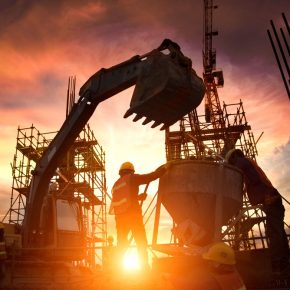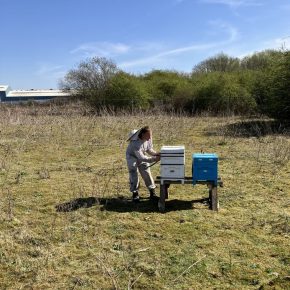
GUEST ARTICLE: Engineering expert warns against machinery inspection complacency during COVID-19 pandemic
As work has recently resumed on many shut-down construction sites, an engineering expert is urging plant hire companies and site managers to check their onsite machinery’s health and safety certifications are up-to-date and valid.
In his address to the nation last Sunday, Prime Minister Boris Johnson urged construction workers to go back to work from the following Monday.
Keith Short, machinery inspection engineer at UK Risk Management & Engineering Services (UKRMES), is issuing a warning that certificates on lifting machinery may have expired on many sites during the lockdown.
Although emergency extensions have been granted during the COVID-19 pandemic, such as MOTs and first aid certificates, the law for Lifting Operations and Lifting Equipment Regulations (LOLER) requirements remains in place.
Keith said that engineering inspections should remain a top priority for fully operational, reopening and closed sites.
“The construction industry is essential for both growing the economy and catering for the country’s growing population but, like other industries, it has been forced to pause many projects due the pandemic,” he commented.
“Whilst some sites have stayed opened during the coronavirus shutdown, many are just starting to resume operations, and many more will follow, after the Prime Minister’s address.
“During this period of readjustment, it can be difficult to grasp what is ‘essential’ and what is ‘non-essential’ but when it comes to thorough examination and testing (TE&T) of plant and equipment, the law is clear.
“In order for sites to hit the ground running when they reopen, dutyholders need to have met their statutory obligation to ensure that work plant and equipment is maintained and is safe to use.
“TE&T is critical to ensure the safe operation of equipment and continues to be a fundamental part of the management process. Failure of machinery through deterioration can create dangerous situations, physical harm and business disruption – which is the last thing that businesses want or need when they are trying to get back on their feet.”

Provision and Use of Work Equipment Regulations (PUWER) and LOLER regulations require equipment used at work to be suitable and safe for use, correctly installed, maintained and used, and to have suitable health and safety controls and markings.
PUWER applies to all machinery, whilst LOLER only applies to lifting equipment, including 360 excavators, backhoe loaders, foreloaders, fork-lift trucks and telescopic handlers to hoists, cranes on machines, and lifting attachments. With LOLER, some extra requirements apply.
Dutyholders must have PUWER and LOLER inspections on machinery and equipment to comply with HSE Regulations, which are legal requirements.
If through an inspection or incident investigation, HSE finds that the regulations were breached or there was negligence, the dutyholder faces prosecution or significant fines.
PUWER and LOLER inspections should be undertaken by an inspector with the relevant engineering experience and knowledge.
Keith added: “Construction is Britain’s second most dangerous industry to work in, with 30 people killed in 2018/19 – taking unnecessary risks is simply not an option,” said Keith.
“During the period of lockdown, HSE has said that dutyholders should ensure inspectors have access to equipment in a timely manner, that they should consider allowing inspectors access to closed sites so that equipment is ready for when the business reopens, and to make reasonable attempts to source engineers from another provider if their usual provider cannot provide the service.
“HSE also said that dutyholders must be able to demonstrate that they have made all reasonable attempts to have the thorough examination and testing (TE&T) carried out within the required timescales.
“However, if equipment is to continue in use without TE&T, then dutyholders must assess the increased risk and take appropriate action to manage it.
“Construction workers face potentially fatal risks on a daily basis, and that is only magnified during times of upheaval, such as this. Now is certainly not the time for complacency and protecting employee safety should remain top priority.”
Keith highlighted that social distancing measures should not be a barrier to inspectors visiting sites and carrying out examinations.
“In this climate, it is understandable that other health and safety concerns are at the forefront of dutyholders’ and site managers’ minds and that they are reluctant to welcome visitors onsite,” said Keith.
“But our engineers remain committed to their duties and will be taking every care and precaution so that they can continue to carry these out.
“The health and safety of our engineers and our clients is paramount and enhanced protective measures will be taken during inspections, including the use of suitable personal protective equipment (PPE), robust cleaning procedures and social distancing.
“Managing risk is an integral part of this industry and keeping construction workers safe during this pandemic is our prime concern.”
Latest news

30th April 2025
Digital Construction Week announces seminar programme for its landmark 10th edition
Digital Construction Week (DCW) returns to ExCeL London on 4 – 5 June 2025 with its most impactful programme yet. It brings together the best and brightest from across AECO, for two days of practical learning and idea sharing.
Posted in Articles, Building Industry Events, Building Industry News, Building Products & Structures, Building Services, Building Systems, Exhibitions and Conferences, Information Technology, news, Restoration & Refurbishment, Retrofit & Renovation, Seminars
29th April 2025
Senior pledges to ‘bee’ part of the solution with new biodiversity initiative
Senior Architectural Systems has installed its first on-site beehive, marking another step forward in its commitment to sustainability and biodiversity.
Posted in Articles, Building Industry News, Building Products & Structures, Building Services, Curtain Walling, Doors, Glass, Glazing, Innovations & New Products, news, Restoration & Refurbishment, Retrofit & Renovation, Sustainability & Energy Efficiency, Walls, Windows
29th April 2025
West Fraser range delivering key benefits for South-East carpentry company
An experienced carpenter and building site manager who has recently set up his own company is using high performance panel products from the West Fraser range.
Posted in Articles, Building Industry News, Building Products & Structures, Building Systems, Case Studies, Garden, Restoration & Refurbishment, Retrofit & Renovation, Sustainability & Energy Efficiency, Timber Buildings and Timber Products
29th April 2025
CPD Courses Available Online From Ecological Building Systems
Ecological Building Systems, a leading supplier of natural building products for sustainable construction, has revealed its comprehensive CPD programme for the year ahead.
Posted in Articles, Building Industry Events, Building Industry News, Building Products & Structures, Building Services, Continuing Professional Development (CPD's), Information Technology, Innovations & New Products, Insulation, Restoration & Refurbishment, Retrofit & Renovation, Seminars, Sustainability & Energy Efficiency, Training, Walls, Waste Management & Recycling
 Sign up:
Sign up: